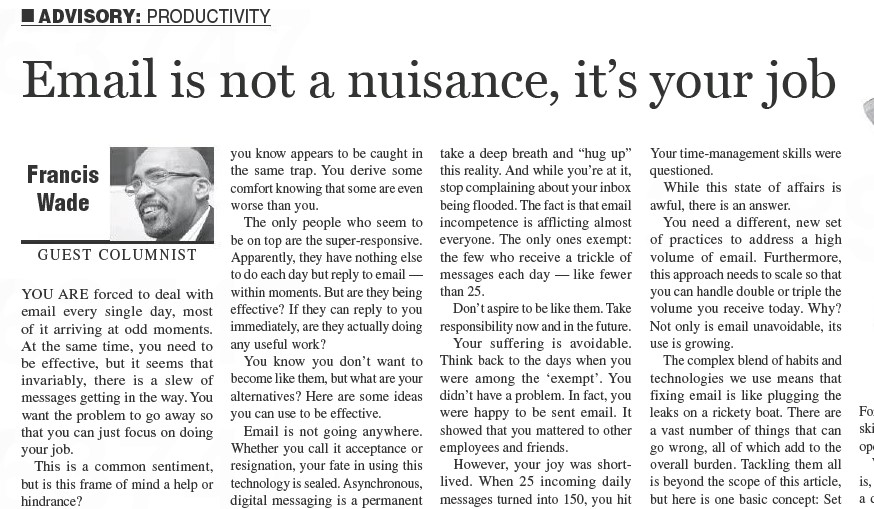You are forced to deal with email every single day, most of it arriving at odd moments. At the same time, you need to be effective, but it seems that there’s invariably a slew of messages getting in the way. You want the problem to go away so that you can just focus on doing your job. This is a common sentiment, but is this frame of mind a help or hindrance?
It’s fashionable nowadays to complain about email. Why? There are always too many messages. They arrive at the wrong time, and important ones get buried by all the others.
But you’re not alone: everyone you know appears to be caught in the same trap. You derive some comfort knowing that some are even worse than you.
The only people who seem to be on top are the super-responsive. Apparently, they have nothing else to do each day but reply to email…within moments. But are they being effective? If they can reply to you immediately, are they actually doing any useful work?
You know you don’t want to become like them, but what are your alternatives? Here are some ideas you can use to be effective.
1- Email is not going anywhere
Whether you call it acceptance or resignation, your fate in using this technology is sealed. Asynchronous, digital messaging is a permanent fact of professional life. In other words, we aren’t going back to the days of paper letters, faxes, or telegrams. And time-consuming meetings, phone calls or Zoom won’t ever become a replacement.
So unless you’re retiring soon, take a deep breath and “hug up” this reality. And while you’re at it, stop complaining about your inbox being flooded. The fact is that email incompetence is afflicting almost everyone. The only ones exempt? The few who receive a trickle of messages each day…like less than 25.
Don’t aspire to be like them. Take responsibility now and in the future.
2- Your suffering is avoidable
Think back to the days when you were among the “exempt”. You didn’t have a problem. In fact, you were happy to be sent email. It showed that you mattered to other employees and friends.
However, your joy was short-lived. When 25 incoming daily messages turned into 150, you hit a threshold: your old techniques stopped working. For example, if you used to check email in the quiet intervals between tasks, meetings or projects, you probably saw this shortcut become impossible.
Instead, evening and weekend email became the norm. Plus, others began to complain that you are not returning messages fast enough. Your “time management” skills were questioned.
While this state of affairs is awful, there is an answer.
You need a different, new set of practices to address a high volume of email. Furthermore, this approach needs to scale so that you can handle double or triple the volume you receive today. Why? Not only is email unavoidable, its use is growing.
3- Instant Repair
The complex blend of habits and technologies we use means that fixing email is like plugging the leaks on a rickety boat. There are a vast number of things which can go wrong, all of which add to the overall burden. Tackling them all is beyond the scope of this article, but here is one basic concept. Set aside high-quality time for email by blocking time each day in your calendar.
With this technique, email transforms from a thankless chore to a prime activity. Here, you can give your full and undivided attention. Consider it to be an appointment you simply cannot skip. A professional requirement. For example, a surgeon would never skip washing her hands before an operation.
Why the high priority? The fact is, each email requires you to make a decision and this takes energy. Add in the fact that you must quickly switch mental contexts from one message to the next, and the challenge multiplies.
It’s as if each day’s most important choices are distilled into a single sprint. If you try to make them piecemeal, prepare to see your inbox turn into a bottomless pit of unmade decisions.
Setting time aside each day is the only way to ensure that the molehill doesn’t turn into a mountain. Unfortunately, it only takes a few days of neglect to turn a peaceful inbox into a ticking time-bomb.
The best method is not to respond like a firefighter. Instead, treat email as a priority that deserves its own time-slot, and mindset. Use a fresh head so that you can make a series of difficult, but high-quality snap-decisions.
Soon, it will become the heart of your job, rather than a nuisance. And you will be effective.
Francis Wade is the author of Perfect Time-Based Productivity, a keynote speaker and a management consultant. To search his prior columns on productivity, strategy, engagement and business processes, send email to columns@fwconsulting.com.

